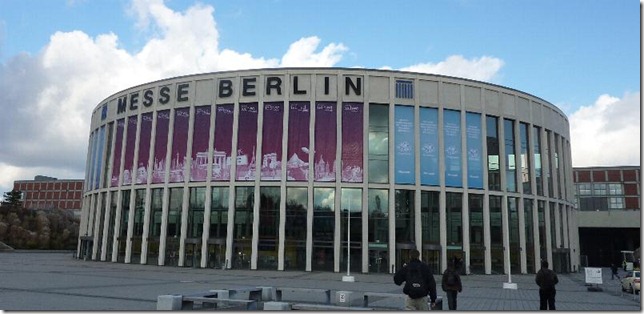What was hot:
Windows Phone 7. The stand where you could try the various handsets was always busy. Several people had their own sets (last year, it was iPhones everywhere). There were adverts all over Berlin too. It won't worry Apple, and Android has reached enough mass to secure second place, but Microsoft should easily beat Symbian and Blackberry especially if they keep up the momentum on updates and new features (HTML 5 browser, apps through private company portals rather than Microsoft's public marketplace).
The cloud. Lots of focus on aspects of Azure, including the announcement of private clouds (Hyper V Cloud) with hosting available. On the developer track, I was pretty interested to learn about the future of distributed LINQ, based on the Microsoft Research DryadLinq project. That project allows you to run distributed (Map/Reduce) queries over an HPC cluster. The future goal is to run it on Azure nodes. Just like in PLINQ where you can append "AsParallel" to a linq statement, you will be able to add "AsDistributed" and the linq statement will be broken up into computation units and run on different nodes (your app.config will also have configuration to help the create the job graph).
Kinect. The graphics are simple and Wii-like, but the demo stand was very popular.
Silverlight. There were quite a few technical Silverlight sessions. From talking to people, it seems Silverlight has taken off for line of business apps within intranets, at least in Microsoft environments where Windows Forms or WPF would have been used before. On the public web, it hasn't dented Flash and Flex, and the only public success is Netflix. But for .Net based IT departments it seems the obvious choice for RIA. The risk from the recent publicity is that managers won't want to invest in it because they think it's dead. Based on the number of sessions here, it's still key to Microsoft.
Berlin. It was cold and grey, and you could only get out after dark, but it's an interesting city to explore. Transport was easy too.
What was not:
Developers. There isn't a lot new this year for developers. We have no new Visual Studio/.Net version.
Although I complained earlier about the heavy "IT Pro" bias, I heard that some infrastructure guys were also disappointed by the content- too much simple introductions and marketing and not enough meat.
Internet connectivity (at the start of the week). Wireless was terrible on the first day, but it did improve - it was excellent on Thursday and Friday. There seemed to be many more power and wired connections this year. Okay, perhaps this point should also be in the "hot" category!
Crowds, It was very busy, and the huge space and confusing layout of the Messe made navigating to sessions a little tricky at times.
Loot. Crap. A stupid little swim-bag, and lots of T-shirts. The organizers and exhibitors have a major lack of imagination and, obviously, money. Where were the USB sticks and other useful give-aways from previous years?
Where's HTML 5?
There were a couple of HTML 5 sessions showing off IE 9, and pretty impressive it is too. There was a pleasing acknowledgement that other browsers exist and also target HTML 5, and IE 9 is just catching up. But there is no tooling, or apparently any due dates. In MVC you can just write the HTML and reference Modenizr etc to trigger down-level support, but there is no intellisense or code colouring yet, let alone HtmlHelpers. It wouldn't be difficult to traditional ASP.Net webcontrols for key HTML 5 tags. It's not just <video>; what I'd like is <input type="date" with an browser datepicker (and down-level detection to add jQuery UI). iPhone and Android (but not Windows Phone 7 yet) have strong HTML 5 features which we want to use. Oh, and the next version of Windows Phone needs to have HTML 5 capabilities to match the desktop IE9. Maybe longer term could Silverlight XAML be converted to SVG?
Where's Alt.Net?
As traditional, this was a Microsoft-only conference. Several presenters used Resharper, and there was the odd passing mention of NHibernate. But when you talk to other attendees, NHibernate, log4Net and other testing frameworks such as NUnit and MbUnit are in widespread use - my impression is that Entity Framework is some way behind. With Oracle doing it's best to alienate Java developers, Microsoft could start showing a friendlier face with a few sessions for Mono, IoC, mocking, BDD, NoSQL etc.
Future
I enjoyed TechEd, but I think the moral of this year is, only go to a TechEd Europe when Microsoft are launching a new Visual Studio or other major developer tool.
